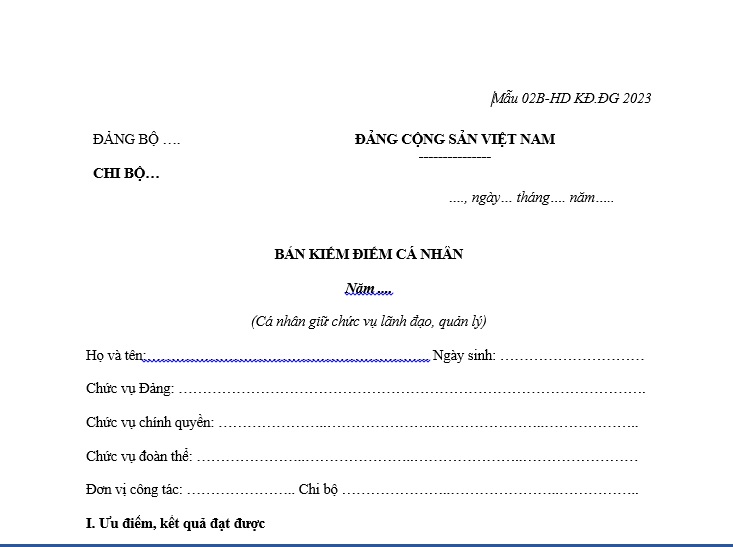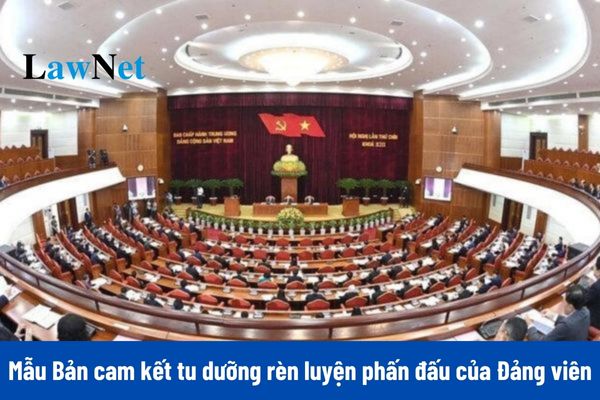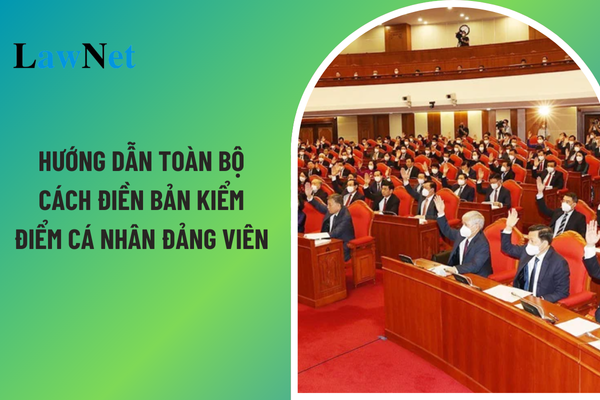What are 03 ways to write the 2024 year-end self-assessment for members of Communist Party of Vietnam who hold leading positions? What is the CPV membership fee for students in Vietnam?
What are 03 ways to write the 2024 year-end self-assessment for members of Communist Party of Vietnam who hold leading positions?
The template for the 2024 year-end self-assessment for members of Communist Party of Vietnam holding leadership and management positions is template 02B-HD KD.DG 2023, issued in conjunction with Guideline 25-HD/BTCTW 2023.
New:
>>> Three Ways to Complete the 2024 self-assessment for Party Members Not who hold leading positions?
Latest:
See Also:
>>> Compilation of Three Plans for the 2024 Year-End Party Member self-assessment Meeting Program?
The template for the 2024 year-end self-assessment for members of Communist Party of Vietnam holding leadership or management positions is as follows:

Template 02B self-assessment for members of Communist Party of Vietnam at year-end 2024 for individuals holding leadership or management positions...Download
Below are three ways to write the year-end self-assessment for members of Communist Party of Vietnam who hold leading positions in 2024:
Method 1:
(1) Detailed information of the Communist Party member:
Include full name; date of birth; position within the Communist Party and any government or organizational positions (if any), along with the name of the unit and the Party cell.
(2) Strengths and Achievements
Firstly, the Party member must highlight their strengths throughout the past year. This must cover the following aspects:
- Political qualities, ethics, lifestyle; solidarity and unity within the organization; discipline, exemplary responsibility, adherence to what Party members should not do; working style and methodology. Relate to manifestations of degradation, "self-evolution", "self-transformation".
- Performance of assigned tasks and goals, and the results achieved during the year.
- Leadership and management achievements; execution of responsibilities and achievement levels of subordinate organizations, agencies, and units; ability to consolidate and build internal unity.
- Responsibility at work; dynamism, innovation, creativity; willingness to think, act, and take responsibility; handling challenging, complex, sensitive issues in task execution.
- Role modeling responsibility individually and within the family; fighting against corruption, negativity, and waste; the trust of officials and Party members.
- Implementation of yearly commitment to self-improvement, cultivation, and striving.
(3) Limitations, Weaknesses, and Causes
Alongside achievements, Party members should also address their limitations and weaknesses for the year and identify the causes.
Also, Party members should mention results and strategies to overcome weaknesses previously identified by authorized levels.
+ Limitations and Weaknesses
For example: Highlight weaknesses in performing professional duties, such as shortcomings in implementing initiatives, innovations, or lacking proficiency in handling complex issues.
+ Causes of Limitations and Weaknesses
For example: Poor time management, indecisiveness in making decisions...
(4) Results in Overcoming Limitations and Weaknesses Previously Identified by Authorized Bodies in Past Evaluations
Clearly evaluate each limitation or weakness (whether it has been overcome; the current status; or if unresolved); any difficulties or obstacles (if any); personal responsibility.
Self-assess on your performance level: Choose one of the following levels (Excellent; Good; Average; Poor)
(5) Explanation of Suggested Issues for Review (if any)
Provide an explanation for each suggested issue, stating the cause and determining personal responsibility for each issue.
(6) Clarification of Individual Responsibility for the Collective's Limitations and Weaknesses (if any)
(7) Directions and Measures to Overcome Limitations and Weaknesses
For example: proactively assign clear tasks and closely monitor work progress. Additionally, organize regular briefings to promptly resolve emerging issues, ensuring tasks are completed effectively and on schedule.
(8) Self-rating Quality Classification
This is one of the key components of the self-assessment. The classifications include: Outstanding completion of duties; Good completion of duties; Completion of duties; Non-completion of duties.

(9) Sign and Print the Name of the Party Member Conducting the Evaluation
(10) Comments from the Head of Agency or Unit, the Party Cell, Party Committee
After Party members self-assess, based on the information provided in their year-end self-assessment, levels including the head of the agency/unit, Party cell, and Party committee will evaluate the Party member.
- The head of the agency/unit for Party members: Provide comments, evaluation, and classify the quality level (if they are officials and public employees).
- The Party cell: Compile the self-assessment classification of the Party member, gather opinions from competent bodies where the Party member resides to propose a classification.
- The Party committee: Summarize, verify, and base on the Party cell's proposal to determine the quality classification of the Party member.
Method 2:
Name; date of birth; positions in the Communist Party and other organizations (if any) and the unit’s name along with the Party cell.
(2) Strengths and Achievements
- Political qualities, ethics, lifestyle; solidarity and internal unity; discipline consciousness, exemplary responsibility, implementation of Party member restrictions; working style and methodology. Relate to manifestations of degradation, "self-evolution", "self-transformation".
Self-assessment according to levels:

Then, you may refer to the criteria below:
- Political qualities: Absolutely loyal to Marxism-Leninism, Ho Chi Minh's thoughts, and the Party’s renewal line; comply, propagate, and persuade the family to follow the Party’s guidelines, State’s policies and laws...
- Ethical qualities and lifestyle: Uphold ethical standards and lifestyle; demonstrate receptiveness to critique and improvements, fight against signs of bureaucracy, corruption, waste, negativity...
- Discipline consciousness: Follow organizational assignments; strictly adhere to what Party members should not do; regularly participate and pay Party dues; exemplify citizens' obligations and maintain regular ties with the local Party committees...
- Working style and methodology: Dynamism, creativity, decisiveness in executing tasks; work scientifically, democratically, adhering to principles; foster cooperation with colleagues.
- Fight against degradation in political ideology, morality, lifestyle, "self-evolution", "self-transformation". (Self-assess against 27 signs, personally identify): Relate to actions like being reluctant to take assignments in challenging places; fostering a seemingly united front, superficial democracy;...
- Execution of tasks and achieving set objectives assigned for the year.
Self-assessment according to levels:

Then, you may refer to criteria including:
- Fulfilling responsibilities and authority as prescribed (Party, government, organizations).
- Quantified results of annual objectives and tasks. For Party members who are officials and public employees, clarify workload, quality, progress, efficiency of tasks; innovation, creativity inclinations; service attitude towards citizens...
- Evaluation results and classification of organizations, agencies, units under direct leadership and management; regular trust assessment results (if any).
- Leadership, management achievements; execution of responsibilities; achievement levels of subordinates; ability to assemble and build internal unity.
Self-assessment according to levels:

Then, you may refer to criteria including:
- Implement and institutionalize the Party’s guidelines and State laws within agencies, organizations, units.
- Maintain discipline within agencies, organizations, units; prevent incidents or violations resulting in disciplinary action; complaints and long-standing grievances; anti-corruption efforts within the jurisdiction of the agency, organization, unit.
- Lead, direct, organize inspections, audits, oversee complaints, resolve grievances authoritatively; guide administrative reforms, streamline public policies, services within organizations.
- Develop annual plans of action for managed agencies, organizations, units, outlining quantified targets.
- Responsibility in work; dynamic, innovative, creative approach; willingness to think, act, and accept responsibility; handling of challenging, complex, sensitive issues.
Self-assessment according to levels:

Then, you may refer to criteria such as:
- High sense of responsibility and dedication; lead and direct units to successfully accomplish assignments; actively pursue scientific studies, embrace modern technology, implement innovative practices.
- Proactively and creatively think, act, and assume responsibility; deliver on promises.
- Understand and rightly perform assigned duties, responsibilities, and powers; exhibit principles, discipline, reason, and empathy in work; avoid abuse of position; oppose tendencies for personal gains or favoritism.
- Firmly oppose parochial or factional attitudes and opportunistic behaviors for personal or "group" interests.
- Role modeling responsibility of self and family; combat corruption, negativity, waste; credibility with officers and Party members.
Self-assessment according to levels:

Then, you may refer to criteria such as:
- Political Ideology
+ Stay unwavering to Marxism-Leninism, Ho Chi Minh's thought, Party’s renovation path, national independence and socialism; lead in fighting degradation of political ideology, morality, lifestyle.
+ Exemplify in executing, propagating and defending the Party’s guidelines, State’s policies; prioritize common interests of the Party, State, and people over personal interests.
- Ethical conduct and lifestyle
+ Strictly follow the Central Committee’s regulations on Party member restrictions and guidance by the Central Inspection Commission.
+ Lead the charge against bureaucracy, corruption, waste; willingly assume and rectify the organization outcomes if under their leadership.
+ Exhibit humility and simplicity; maintain close contact with reality, grasp legitimate wishes of the public, primarily within organizations and communities.
+ Refuse any bribery with ulterior motives; prevent relatives from exploiting one’s position for personal gains.
- Self-criticism and peer criticism
+ The leader must be an example of self-criticism for subordinates to follow.
+ Engage in self-criticism and peer criticism earnestly, uninhibitedly; accept shortcomings and plan corrective actions.
- Mutual affection and solidarity among comrades; protect rightness and advocate goodness; oppose criticism with malicious intent.
- Relationship with the people
+ Prioritize serving the people; work impartially, objectively, and address legitimate people's concerns earnestly.
+ Serve as a model citizen in the community.
+ Combat insensitive, bureaucratic, and authoritarian behaviors and behaviors that cause public discomfort.
- Work Responsibility
+ Prioritize work responsibility, dedication; lead and direct units to fulfill assignments commendably; adopt and use modern scientific, technological innovations.
+ Understand and rightfully perform designated responsibilities, duties, and powers; abide by principles, rules, infusing reason and emotion; avoid abusing authority; oppose tendencies for personal or corrupt favors.
- Discipline Awareness
+ Rigorously apply democratic centralism; promote democracy, maintain discipline in organizations, agencies, units.
+ Follow directives, organizational respectively; lead in practicing regular principles, charter, and party policies...
- Internal Solidarity
+ Invest wholeheartedly in building and strengthening internal solidarity; care for material and spiritual lives of cadres within organizations and communities; impartially treat subordinates; cooperate with peers.
+ Genuinely support colleagues in work and life; defend a willful, upright reputation.
+ Actively engage in building local, organizational Party policies; combat divisiveness and fragmentation within.
- Execution of annual self-cultivation, training, striving commitments
Refer to the following criteria:
+ Enhance task responsibility; innovate work methods and lifestyle; promote Party policies, gain family and public adherence to Party guidelines and State laws.
+ Proactively study for improved professional competence and performance of responsibilities.
+ Consistently follow annual commitments on self-cultivation, training, striving; emulate and follow Ho Chi Minh's ethical, lifestyle example.(2) Limitations, Shortcomings, and Causes
- Limitations and Shortcomings.
- Hesitance in making proposals, providing advisory...
- Insufficient time dedicated to understanding and researching the platform and charter of the Communist Party, and the policies and laws of the State.
- Lack of sensitivity in implementing new policies, resolutions, and policies of the Communist Party and the State.
- Not being bold and straightforward in contributing opinions and feedback on work.
- In evaluations, use, and allocation of management officials, overly deferential, localized, not focusing on discovering and having genuine mechanisms to employ those with talent and virtue.
- Causes of Limitations and Shortcomings.
- Limitation is hesitance and not being frank in contributing opinions and feedback on work.
The cause is due to politeness, leading to evaluations and criticisms not being truly objective, and failing to assess the essence of issues correctly.
- Or limitation is not spending enough time understanding and researching the platform and charter of the Communist Party, and the policies and laws of the State.
The cause is overly focusing on work, not arranging the time fund reasonably, leading to insufficient time for research and understanding.
(3) Results of Overcoming Limitations and Shortcomings Concluded by Authorized Levels or Pointed out in Previous Reviews
Clearly review each limitation and shortcoming (have been rectified; are being rectified, the extent of rectification; not yet rectified); difficulties and obstacles (if any); personal responsibility.
Self-assessment on the level of implementation:

Possible considerations:
- Actively participating in personal capacity development training regarding promoting learning and following Ho Chi Minh's ideology, ethics, and style, and regulations on exemplary responsibility. Thereby working more effectively in their role, possibly applying specialized knowledge and skills to daily work appropriately;
- Changing mindset, applying new knowledge and skills they have learned to work, creating innovative ideas and problem-solving solutions.
(4) Explanation of Issues Suggested for Review (if any)
Explain each issue suggested for review, stating the cause and identifying personal responsibility for each suggested issue.
(5) Clarify Personal Responsibility for the Limitations and Shortcomings of the Collective (if any)
(6) Directions, Measures to Overcome Limitations and Shortcomings
- Strive to promote strengths, overcome criticism and self-criticism among colleagues, being bold, actively contributing opinions more in branch activities. While handling work, be flexible, proactive but cautious, showing a decisive, firm attitude in combating maximal acts of embezzlement, corruption, and wrongdoings of fellow comrades and colleagues, thereby contributing to building a strong Communist Party and government;
- Consciously study, actively research, update knowledge, and new legal documents to continually improve professional competence; creating a foundation to disseminate legal knowledge and policies of the Communist Party Commission and State to all citizens;
- Be self-aware of practicing impartial, objective, honest, boldness, and speaking candidly, truthfully, sincerely;
- Regularly and actively cultivate and practice ethics and lifestyles to improve political, theoretical, and professional expertise.
(7) Self-assess the Quality Rating
This is one of the most important contents of a self-assessment. Levels include outstanding completion of tasks; Good completion of tasks; Completion of tasks; Non-completion of tasks.

(9) Sign and Clearly Write the Full Name of the Evaluated Party Member
(10) Comments by the Head of Agency, Party Cell, Communist Party Commission (Party Cell)
After the Party member self-evaluates, based on information self-assessed by the Party member in the end-of-year Party member self-assessment, the levels include the Head of the agency, unit; Party cell, and Communist Party Commission will evaluate that Party member.
- Head of the agency, unit of that Party member: Comment, evaluate, and propose quality rating (if officials and public employees).
- Party cell: Gather the self-rating level of Party members, opinions from competent agencies where Party members reside to propose a rating level.
- Commission: Consolidate, appraise, based on the Party cell's proposal to decide on the quality rating of the Party member.
Method 3:
(1) Detailed Information of the Party Member:
Full name; date of birth; position in the Communist Party and governmental, collective position (if any) along with the work unit and name of the Party cell.
(2) Advantages and Achievements
- Advantages in leadership and management.
+ Evaluate leadership, administrative skills, and orientation in work, clearly stating the role of guiding the collective to complete tasks.
+ Emphasize the sense of responsibility and exemplary conduct of oneself, especially in strictly adhering to the regulations of the Communist Party and the laws of the State.
Example:
"Always perform well in leadership and management roles, providing clear orientations to help the collective achieve work targets. Emphasize responsibility and setting an example in all activities, strictly complying with regulations of the Communist Party and the State."
+ Achievements in professional work and assigned tasks.
+ Present specific achievements attained in the unit, particularly targets or tasks completed beyond expectations.
+ Highlight innovations and improvements in management processes that bring high efficiency to work or enhance productivity within the collective.
Example:
"Have directed the completion of key tasks of the unit, achieving and exceeding set targets for the year. Introduced procedural improvements in working processes, increasing work efficiency and saving processing time for employees."
- Advantages in political ideology.
+ Clearly state firmness, loyalty to the ideology, and path of the Communist Party, the spirit of solidarity and responsibility in building the Party and Party cell.
+ Emphasize one's responsibility in motivating, encouraging, and bonding members in the organization to build a strong collective.
Example:
"Always maintain a firm ideological stance, fully implement the Communist Party's directives, simultaneously fostering solidarity in the unit. Frequently encourage and motivate staff and employees to strive to complete their tasks."
- Morality, lifestyle
+ Evaluate the maintenance of moral qualities and a healthy, exemplary lifestyle as a leader.
+ Clearly state impartiality and objectivity in work, public service spirit, and unity, supporting colleagues.
Example:
"Maintain bright moral quality, lead a healthy, fair lifestyle, and remain objective in management work. Always uphold the spirit of serving the public, maintaining internal solidarity, and being ready to support colleagues."
- Results in nurturing, training, and developing human resources.
+ State specific results in nurturing and training staff, building high-quality human resources for the organization.
+ Refer to training programs, and experience-sharing sessions to help the staff develop professionally, stay committed, and exploit their potentials.
Example:
"Organized training programs and experience-sharing to enhance professional competence for staff and employees. Always focus on nurturing new talents, creating conditions for them to exploit capabilities and contribute positively to the unit's development."
(3) Limitations, Shortcomings, Causes
- Limitations in leadership and management
+ Assess shortcomings in leading and managing the collective, such as oversights in directing, personnel management, or task coordination and execution.
+ If there are delays in task implementation or directives not executed effectively, it must be clearly stated.
Example:
"Despite fulfilling leadership and management roles, at times, the directive work was not done promptly, leading to delays in implementing certain missions. Some decisions lacked high consensus within the collective, resulting in suboptimal work effectiveness."
- Limitations in professional work
+ Present weaknesses in performing professional tasks. It can be shortcomings in implementing innovations or not being capable enough to solve complex issues.
+ If there are tasks poorly completed or targets not met, it must be clearly stated.
Example:
"In professional work, sometimes I don't spend enough time tracking specific tasks, leading to some issues not being thoroughly addressed. Some procedural improvement initiatives have not been fully implemented, not yielding high efficiency as expected."
- Limitations in political ideology
+ State shortcomings in learning and implementing the Communist Party’s resolutions and directives. It can be a lack of initiative in updating and researching directive documents of the Communist Party, leading to uneven or inconsistent implementation.
+ If there are mistakes in implementing superiors' directives or failing to meet deadlines, it must be mentioned.
Example:
"At certain times, I have not thoroughly and promptly updated new resolutions and directives of the Communist Party, resulting in occasional uneven and untimely policy and plan implementation."
- Limitations in morality, lifestyle
+ Present shortcomings in one's moral qualities and lifestyle, which may be not showing enough exemplary behavior in work or daily life.
+ If there are behaviors not fitting the standards of a Communist Party member, it should be clearly stated.
Example:
"In work and life, sometimes I have not maintained the exemplary lifestyle as desired. Occasionally, because of work pressure, I did not tightly connect with colleagues, nor wholeheartedly shared and assisted comrades in difficulties."
- Causes of Limitations and Shortcomings
+ Analyze subjective and objective causes leading to the noted limitations and shortcomings. It can be individual factors like lack of time management skills or objective factors like excessive workload, lack of subordinate support, etc.
+ Clearly state the causes to better understand the issues and find solutions.
Example:
"The main reason for the above limitations is occasionally not taking the initiative in task assignment and progress review of departments. Additionally, a large workload and insufficient coordinated support from sections are objective factors affecting work efficiency."
- Conclude this section by showing seriousness in self-criticism and commitment to overcoming limitations and shortcomings in the future. This is also the time to show responsibility and progressive spirit as a Communist Party member holding a leadership position.
Example:
"I am aware of my limitations and shortcomings in leadership and management. I commit to seriously overcoming these weaknesses through improving management skills, communication, and coordination among sections. Additionally, I will allocate more time for nurturing moral qualities and exemplary lifestyle."
(4) Results of Overcoming Limitations and Shortcomings Concluded by Authorities or Pointed out in Previous Reviews
Review and score each limitation and shortcoming (resolved; being resolved, the degree of resolution; unresolved); individual responsibility regarding difficulties and obstacles (if any).
Party members self-assess the implementation level: Choose one of the levels (Excellent; Good; Average; Poor).
(5) Explanation of Suggested Review Issues (if any)
Explain each suggested review issue, state the cause, and identify the individual's responsibility for each suggested review issue.
(6) Clarify Individual Responsibility for Collective Limitations and Shortcomings (if any)
(7) Directions and Measures to Overcome Limitations and Shortcomings
- Directions to overcome leadership and management limitations
+ Propose measures to improve directive and executive capabilities, ensuring timely and effective leadership.
+ Strengthen proactivity in job assignments, monitoring progress, cooperating with departments and employees for better outcomes.
Example:
"To overcome the shortcomings in leadership and management, I will proactively assign tasks clearly and closely monitor work progress. Besides, I will organize regular briefings to promptly address emerging issues, ensuring work is carried out effectively and on schedule."
- Directions to overcome professional work limitations
+ Propose plans to enhance professional capabilities, improve management, problem-solving, and innovation skills at work.
+ Research and apply initiatives, standardize work processes, and improve management methods for higher efficiency.
Example:
"I will participate in training and professional development courses to enhance skills in handling complex issues. Moreover, I will apply modern work management tools, improving work efficiency for myself and the team."
- Directions to overcome training and human resource development limitations
+ Propose measures to improve human resource training and development work in the unit, providing opportunities for personnel to develop and enhance professional skills.
+ Focus on developing successor teams, helping comrades in the unit maximize their potential and have advancement opportunities.
Example:
"I will organize skill training programs, providing learning opportunities to enhance capacities for cadres and Party members in the unit. Simultaneously, I will actively seek and nurture new elements to build high-quality human resources for the future."
(8) Self-assess the Quality Rating
This is one of the most critical aspects of a self-assessment. The ratings include Outstanding Completion of Tasks; Good Completion of Tasks; Completion of Tasks; Failing to Complete Tasks.

(9) Sign and Clearly Write the Full Name of the Evaluated Party Member
(10) Comments by the Head of Agency, Party Cell, Communist Party Commission (Party Cell)
After the Party member self-assesses their rating, based on the information self-assessed by the Party member in the end-of-year Party member self-assessment, levels include the Head of the agency, unit; Party cell, and Communist Party Commission will evaluate that Party member respectively.
Note: The information is for reference only!

What are 03 ways to write the 2024 year-end self-assessment for members of Communist Party of Vietnam who hold leading positions? (Image from the Internet)
What is the CPV membership fee for students in Vietnam?
Based on sub-item 4 of Section 1, Part B of the Regulation on membership fee policies issued with Decision 342-QD/TW of 2010 regarding monthly membership fee obligations for Party members as follows:
Subjects and monthly membership fee obligations of Party members
Monthly income for calculating membership fee includes: salary, some allowances; wages; living expenses; other income. Party members with regular income determine membership fee based on a percentage (%) of monthly income (before personal income tax); Party members who cannot determine their income have specific monthly fee levels for respective subjects.
...
4- Other Party members within the country (including agricultural, rural Party members, and Party members who are students…): pay membership fees from 2,000 VND to 30,000 VND/month. For Party members beyond labor age, the fee is 50% compared to those within labor age.
...
Thus, Party members who are students pay membership fees from 2,000 VND to 30,000 VND/month.
How to deduct and pay membership fees in Vietnam?
According to sub-item 1, Section 2, Part B of the Regulation on membership fee policies issued with Decision 342/QD-TW of 2010 regarding specific deductions and payments of collected membership fees within the country:
- Direct Party branches under grassroots Party committees retain 30% to 50%, submitting 50% to 70% to higher-level committees.
- Grassroots Party organizations in communes, wards, commune-level towns keep 90%, submitting 10% to higher-level committees.
- Other Communist Party organizations retain 70%, submitting 30% to higher-level committees.
- Upper-level organizations above the grassroots level can retain 50%, submitting 50% to higher-level committees.










- Download the file to look up which goods are not eligible for VAT reduction in Vietnam under Decree 72
- How to download the latest 2024 HTKK software (version 5.2.4) from the General Department of Taxation of Vietnam?
- Is there a Draft outline for the Law on Personal Income Tax replacing the Law on Personal Income Tax 2007 in Vietnam?
- What is the reference number of the tax receipt in Vietnam? What is the use of a reference number of the tax receipt when the tax receipt is burned?
- What is a form number of the receipt in Vietnam? Does the report on the use of receipts include the contents of the form number of the receipt?
- What is the environmental protection fee for natural gas obtained in the process of extraction of crude oil in Vietnam?
- What are cases of cancellation of outstanding tax in Vietnam?
- When are household businesses eligible for cancellation of outstanding tax in Vietnam?
- Is cell phone allowance subject to personal income tax in Vietnam?
- What is the VAT declaration form for computer-generated lottery business in Vietnam?

